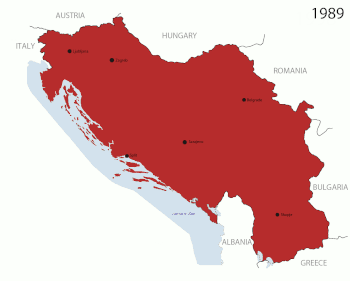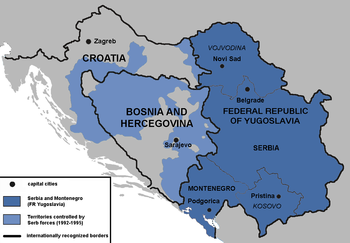| The government building in the centre of Sarajevo burns after being hit by tank fire during the siege in 1992 (Photo credit: Wikipedia) |
| Slobodan Milošević, Alija Izetbegović and Franjo Tuđman signing the Dayton Agreement in Paris on December 14, 1995. (Photo credit: Wikipedia) |
| Animated map of the Yugoslav Wars. (Photo credit: Wikipedia) |
| Territories of the Republic of Bosnia and Herzegovina and the Republic of Croatia controlled by Serb forces 1992-1995. (Photo credit: Wikipedia) |
I was a little hesitant about writing
such a piece because the trigger for it was the appallingly bad behaviour of
the Aussie cricket team after defeating New Zealand in the final of the Cricket
World Cup. This was a victory that I had taken to be inevitable and it occurred
because of the superior skills of the Australians. But still, beginning on such
a basis, a piece along those lines could hardly help but degenerate into
arguments that, frankly, must be nationalistic. While I was still mulling over
this idea I picked up a book that was lying around in the Croatian household in
which I am currently staying, called Seasons
in Hell: Understanding Bosnia’s War. Published
in 1994, the book was written by
Ed Vulliamy, a Guardian reporter who covered what is known to the outside world as
the Yugoslav war, that raged through most of the 1990s, and was brought to an
end in 1995 with the Dayton Agreement, cobbled together by the international
community that can now be said to have signally failed to rise to the grave
circumstances with which the war confronted them.
This was a war in which nationalisms
raged even among people who had lived peaceably side by side for decades, even
for hundreds of years, but who began, under the influence of these
nationalisms, to perpetrate almost indescribable barbarities on each other. I
had only to read Vulliamy’s first chapter, entitled War of Maps, to abandon any idea of writing anything that might
carry even a whiff of nationalism, which
has never before --- at least not in modern times --- demonstrated so
clearly its poisonous qualities.
Vulliamy writes that the
commonly-held idea that the war was too complicated to understand was a
complete fallacy. “Bosnia’s war is cruelly simple,” he writes. “It is the
result of the resurrection in our time of the dreams and aggrieved historical
quests of two great Balkan powers of medieval origin, Serbia and Croatia, and
the attempt to re-establish their ancient frontiers with modern weaponry in the
chaos of post-communist eastern Europe.”
Caught between them was a third
people, who historically speaking did not belong anywhere, and these were the
Slavic Muslims, converted during the longish Ottoman occupation of the area,
and mostly resident in the third entity, Bosnia, which was about equally shared
between Serbs, Croats and Muslims.
The war was between what he called
two narods that being a Slavonic word
that means “a people” and “a nation” at
the same time. Once the demons of these nationalisms were released --- the main
agitator being Slobodan Milosovic, a
rising Serbian politician who rode his horse right into the presidency of what
was still called Yugoslavia --- civilization as we think of it virtually
collapsed. “You hear it everywhere in Yugoslavia nowadays,” Vulliamy writes,
“the Hrvatski narod, the Croatian
people; the Serpski narod, the
Serbian people; and also the Bosanski
narod, the Bosnian people,….and, of late, the Mussulmanski narod, the Muslim people, too.”
At an early stage of his coverage of
the war, Vulliamy found that if he asked a question about yesterday’s artillery
attack, the answer was quite likely to begin in the year 925, “invariably
illustrated with maps.” That is why he
called it “the War of Maps.” Historically, wave after wave of outside
conquerers had swept through the entire territory, Christians of Charlemagne’s
Roman Catholic empire coming from the west, eastwards, and the Orthodox
Byzantine emperors coming from the east, sweeping westwards. The principality
of Serbia “emerged under the tutelage of Byzantium”, and evolved into a
powerful independent kingdom under its own Emperor up to 1346, but in the
following century was “buried under the Turkish advance,” leaving behind in
Serbia’s former empire “a vigorous cultural nationalism which has since refused
to die.”
For their part, the Croatians had
first accepted the suzerainity of the Christian Charlemagne, but were later
overcome by the advancing forces of Byzantium. In 924, however, a Croatian
king, Tomislav, freed himself from the two dominating influences and
established himself over a vast area reaching as far north as the Hungarian
border, and east towards what has become Serbia. Some of the maps that were
revived on both sides when the modern war was breaking out, show his borders reaching
even further. But his empire lasted only three years and was quickly absorbed
into the Hungarian rule.
The result of this plethora of maps
is that Serbia and Croatia, both obsessed with their past, both of them stewing
over indignities visited on them in history, each claimed borders that
overflowed their neighbours’ claims.
The context of the war, he writes,
was the surge of popular revolutions against communist tyranny that followed
the falling of the Berlin wall in 1989, the Yugoslav narod being only two or three of about a dozen from Russia,
Slovakia, and other modern nations (Ukrainians, Georgians, Armenians, all of
which have rebelled from overlord rule,
being among them.)
The rest of Vulliamy’s book describes
his horrendous experiences as he covered the war for more than two years. He
did not follow the old rule that no story is worth dying for. Appalled by the
brutality with which the Serbs carried out the “ethnic cleansing” of
territories in which they were the majority population in Bosnia, this reporter
attached himself to convoys of people who had been subjected to the ultimate
indignity, not for anything they had done but just because they actually
existed. He describes the methods used
by the bully boy army of Serbian-Bosnians led by the psychiatrist Milovan Karadzic, and his leading general Ratko
Mladic, neither of whom can be described as fully sane. These methods went
something like this: a unit would lob a grenade into a house in which people
were probably living an ordinary life, then they would enter the house, begin
beating the inhabitants mercilessly, probably killing most of the able-bodied
men, then they would turn those who were left --- usually women, children and the
aged --- into the streets, tell them to head in a certain direction and never
to turn back. Along the way, sometimes travelling in their own cars, sometimes
in buses and trucks, often walking, they would be fired upon, spat on, beaten,
and finally robbed, so that they became a walking mass, heading into the
forests in an almost vain hope that they were heading towards people who might
welcome and save them. Behind them the attackers would have driven trucks to
the houses to strip them of their contents before setting fire to them, or
blowing them up. Or, in certain houses too good to blow up, to move into them.
Needless to say, in this disgraceful
human landscape, Vulliamy encountered some people who showed heroism in face of
these brutalities, some younger people who exhibited undoubted qualities of
leadership which emerged simply under the pressure of events, and he does full
credit to them. He also mentions that of
150,000 Serbs who were living in Sarajevo before the Serbs put that city under
a four-year siege, some 90,000 never left, but stayed to defy the best efforts
to displace or murder them, by their fellow-Serbs.
I had not realized before that there
were actually two wars fought over Bosnia. The first by the Bosnian-Serbs
(reinforced by the Yugoslav army, the fourth most powerful in Europe, which
became a weapon in the Serbian armoury), a war fought as they battled to expel all Croats and
Muslims from the territories that they fully expected to absorb into a Greater
Serbia (they actually formed a Serbian Republic of Bosnia-Herzegovina, which,
in the eventual settlement, was recognized by the international community as
the Serpska Republic, a semi-autonomous area within the republic of
Bosnia-Herzegovina.) The second war was
fought by a Fascistic army of Bosnian-Croats, most of them emanating from
Montenegro in the south, who changed their minds in mid-battle and joined the
Serbs in ethnically cleansing the Muslims from the territories that they, the
Croats, fully expected to absorb into the state of Croatia. (In fact, these Croats,
like the Bosnian Serbs, formed their own, never recognized republic which they
called the Croatian Union of Herzeg-Bosna).
Each of these entities formed their own army, and the state of
Bosnia-Herzegovina also managed to cobble together an army to try to defend
their abandoned citizens. He records that each of these sides at various times
committed unpardonable atrocities, but that most of these were committed by the
Serbian and Croation ethnic cleansers.
If readers have formed the opinion
that this was a dog’s breakfast, they may be pardoned for doing so. But Vulliamy
shows that such emphasis on the past, on the blood of the narod, such concentration on the injustices worked years and even
centuries before on your group, had their impact in the present day on the poor
people who were rooted out of homes that were destroyed as soon as they left
them, and who were left to wander aimlessly, until most of them wound up in
existing cities, or in expanded villages, where (as in the infamous case of the village of Srebrenica, which must
have happened after Vulliamy ceased to be an active correspondent there,
because he doesn’t mention it in the book, Muslims were promised shelter by the
UN, whose soldiers then stood aside and watched as Mladic’s army massacred an
alleged 8000 men).
I have visited Sarajevo, once a
proudly racially-mixed city, now one that is racially-divided, as everywhere
else in the former Yugoslavia is; I passed through Mostar, whose ancient and
much-prized historical bridge over the river was wantonly destroyed by Croatian
guns in their quest for a racially-cleansed city (which, needless to say, they
have succeeded in creating, the Muslims now being confined to “across the
river”, while the Catholic Croats occupy the rest of the former town).
The lessons of these wars, and of
this book, is that nationalism is poison as a guide to action. And it is deeply
ironical that in this age in which we know more about everything than human
kind has ever known before, our populations everywhere seem to be breaking into
smaller and smaller groups, each of them occupied by a narod of some kind, determined to defend its space against
surrounding possible-enemies. I can count at least half a dozen units that have
been established from breakaways in Europe, as many in the former Soviet Union,
and as many again in Africa and the Middle East. (In this latter region, there
seems to be some sense in the upheavals, because their borders were dictated by
the colonial powers, and took no notice of ethnicities, cutting them in some
cases --- the Kurds are an excellent example --- between three, four and even
more states.
An example closer to our own backyard
is the failure of the Federation of the West Indies, since broken into a
plethora of tiny states that have proven vulnerable to drug-trading criminals
and the like, and many of which cannot summon the strength even to defend their
own indigenous cultures.
These nationalisms are a curse, and
nowhere is that clearer than in the former Yugoslavia, whose people turned on
each other ferociously, and for all their killings and betrayals appear to have
received no benefits except national passports and borders, erected at the very
moment that in the rest of Europe such impediments to free movement have come
down.




No comments:
Post a Comment